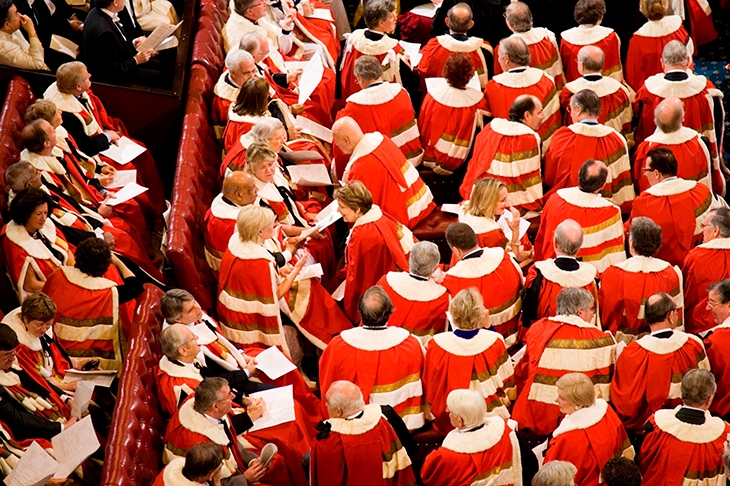Having only recently entered the House of Lords, I must tread with caution, but I had always understood that it is chiefly a revising chamber. By strong convention, it does not reject legislation arising from the election manifesto of the party victorious in the House of Commons. Yet on Monday night, faced with the Internal Market Bill (which helps provide for a full Brexit), it attempted no revision at all. The House was sitting in committee, whose very purpose is revision, but the anti-government majority was on such a high horse that it happily let an amendment from critics of the government fall. It refused to engage. A key feature of the Bill is to ensure that Northern Ireland should maintain ‘unfettered access’ to trade with the rest of the United Kingdom. That is the basic right of any customs territory and must be asserted if a foreign power (in this case, the EU) tries to remove it. Yet Lord Judge, the Bill’s leading opponent, declared this clause ‘contaminated’ by another one. Instead of trying to rectify that contamination in committee, he condemned the whole thing. Instead of revising, the House of Lords was opposing, which is dangerous. When the Commons returns the Bill to the Lords, it should ask them to engage with the clauses they failed to discuss in detail — which is a polite way of saying: ‘Do your proper job.’
The scale of the government defeats was huge — 433 to 165 and 407 to 148. Feeling was genuinely running high. But I wonder if the numbers had something to do with the fact that we can all vote virtually through ‘Peer-hub’ and do not, as would usually be the case, have to attend the House to vote. I lay in bed in Sussex, wearing earpieces so as not to disturb my wife, and tried to listen on a poor connection to the distinguished orations. Then I pressed the button twice, casting my second vote (for the Bill) at 11.07 p.m., and fell asleep. All peers are entitled, under Covid regulations, to claim money for doing this (though many of us don’t). The process is not conducive to the careful deliberations on which the Lords pride themselves.
This column has earlier noted the contrast between the zeal of Jesus College, Cambridge to castigate its 17th-century benefactor, Tobias Rustat, because of his connections with slavery, and its uncritical links with the Chinese Communist regime. The college’s Legacy of Slavery Working Party has now completed its work on Rustat. As a ‘first step’, a prominent plaque will be commissioned which ‘critically acknowledges’ his and the college’s links with the slave trade. The biggest problem is the Rustat memorial in the chapel, a work of Grinling Gibbons’s atelier. In her letter about this to Jesuans, the Master, Sonita Alleyne, says: ‘Council decided that the memorial represents a celebration of Rustat, which is incompatible with the Chapel as an inclusive community and a place of collective wellbeing, and proposed that it should be removed. Our current intention is to relocate the memorial to an educational exhibition space.’ The snag is that you cannot just chuck out stuffy old memorials to people you have decided to hate. The chapel is Grade 1-listed. As an ecclesiastical building, says the Master, it ‘falls under Faculty Jurisdiction Rules operated by the Church of England’. Talks are going on with the Diocese of Ely: ‘The Church is very supportive of our considerations.’ Inside all this lurks a big point. Until now, it has not been permissible to remove historic church works of art because you disapprove of them or their subjects. Is the Church of England, itself reviewing its policy on statues, about to change this? If so, it would abandon its role as custodian and revert to the situation under Oliver Cromwell in which the altars — and other furnishings — were stripped to enforce an ideology. ‘This is not a question of judging the past,’ says Ms Alleyne, in another letter. Surely that is exactly what it is.
Jesus is renouncing Rustat, but not his money. One distinguished Jesuan, the former ambassador Sir John Jenkins, replied to the Master, ‘wondering whether, if you decide to move Rustat’s … memorial, you shouldn’t also try harder either to reallocate his money for some socially useful and more relevant purpose unrelated to the College or simply renounce it altogether’. He also noticed the college’s continuing China links: ‘Given the presence in the College of the China Centre, will you also be making some public acknowledgement of the sustained repression by the Chinese government of their Uighur community and indeed… of Tibetan culture and independence?’ Ms Alleyne promises: ‘Our China Centre events will reflect a full range of opinions as they move to a virtual environment. The academics whose work inform [sic] both the China Centre and the China Dialogue Group have academic freedom and are able to properly explore all issues; both engaging with and being critical of issues around China.’ So far, it would be fair to say, the college website offerings on China show no sign whatever of that freedom being exercised.
I was glad A.N. Wilson chose as his Christmas book (see last week) The Windsor Diaries of Alathea Fitzalan Howard (Hodder and Stoughton). Some reviews have disparaged the book as dull or limited. This is unfair to a girl who is only 16 when the story begins in 1940. It also misses the point: the value of diaries is not necessarily literary, but that they capture for posterity the milieu in which they were written. By chance of noble birth and unhappy family circumstances, Alathea found herself living next to the Princesses Elizabeth and Margaret Rose in Windsor throughout the second world war. She captures that tiny, peaceful island in a world on fire. As she herself writes, people say ‘that life here at Cumberland Lodge is false; I can see now that they are right, but it is precisely that sense of unreality, that lack of connection with the outer, the real world, that appeals to me’. Interestingly, the one character in the diaries who does exhibit a steady sense of reality is the future Queen.
Got something to add? Join the discussion and comment below.
Get 10 issues for just $10
Subscribe to The Spectator Australia today for the next 10 magazine issues, plus full online access, for just $10.
You might disagree with half of it, but you’ll enjoy reading all of it. Try your first month for free, then just $2 a week for the remainder of your first year.















Comments
Don't miss out
Join the conversation with other Spectator Australia readers. Subscribe to leave a comment.
SUBSCRIBEAlready a subscriber? Log in